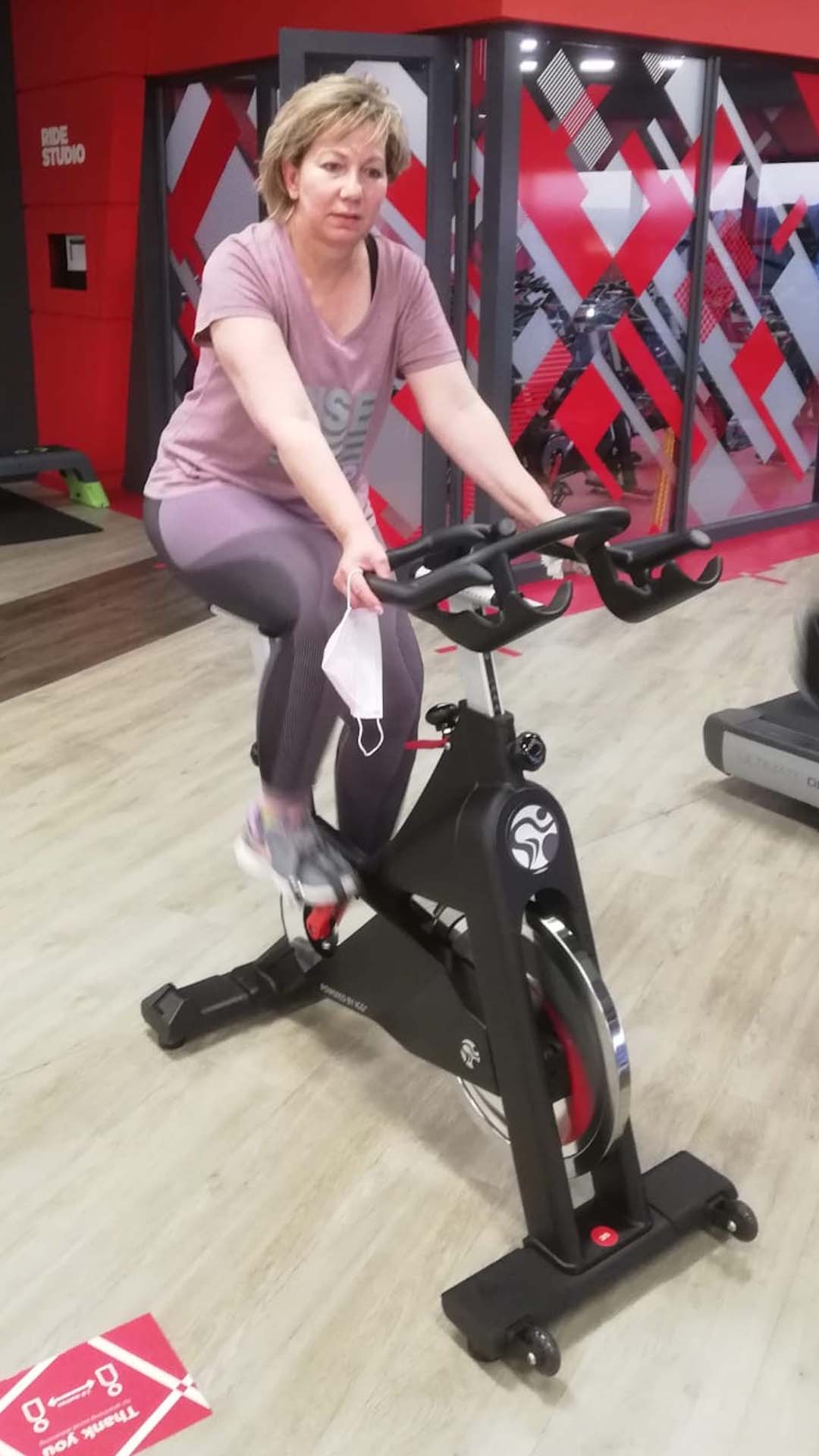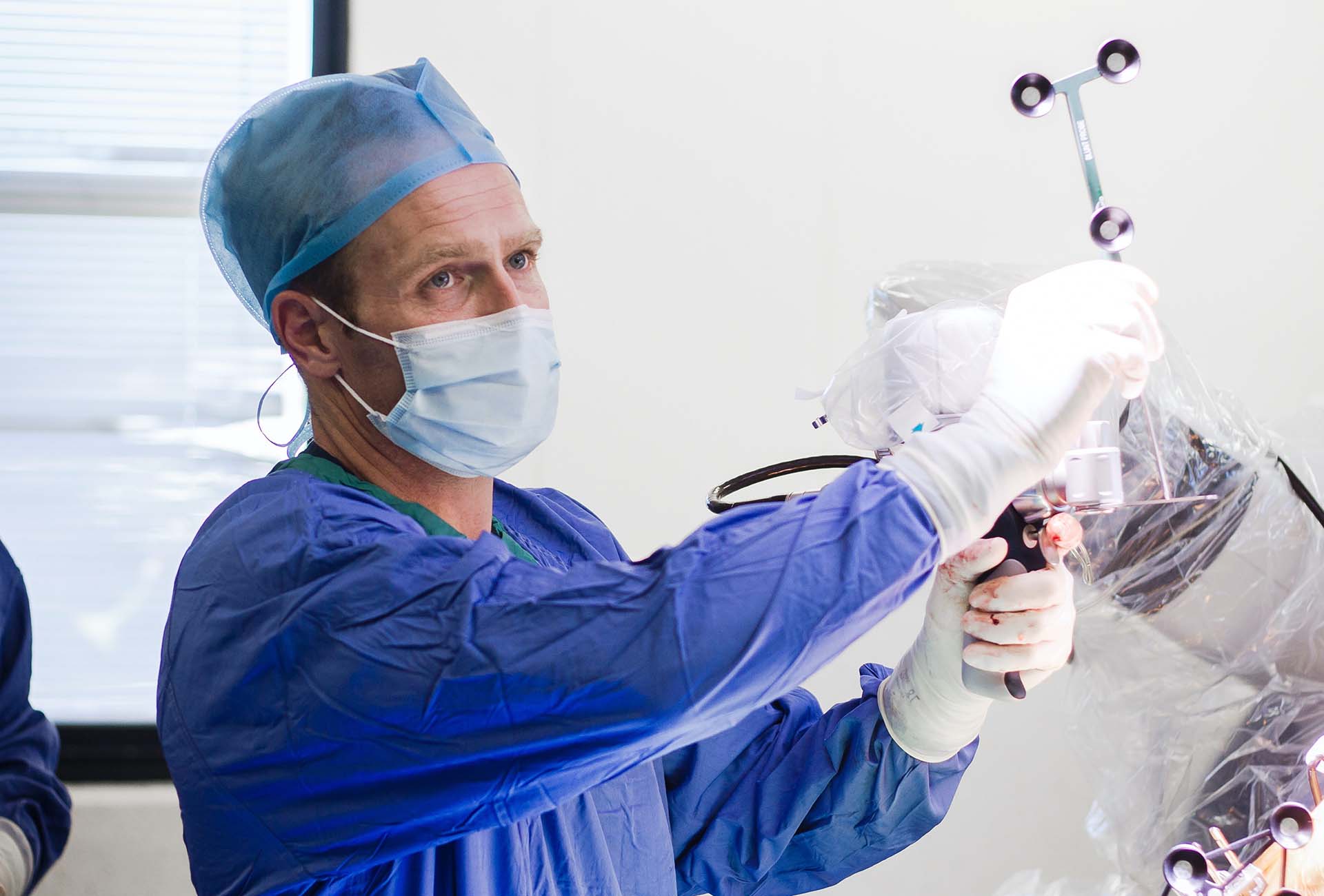Melanie is on the mend thanks to robotic arm assisted knee surgery
Orthopaedic surgeon Dr Mark van der Kaag is pictured performing a partial knee replacement using the MakoSmartRobotics™ surgical system, which combines 3D CT scan based planning, AccuStop technology and insightful data analytics for total and partial knee replacements and hip replacements.
Western Cape hospital introduces precision high-tech option for knee replacements
“I dreaded going to the shops before I had my partial knee replacement. I was in constant pain and it was stealing from my quality of life. There were so many everyday activities that became virtually impossible for me,” recalls Melanie van Heerden. She was the first person to have Mako robotic arm assisted surgery at Netcare Blaauwberg Hospital, the only facility in the Western Cape offering this advanced precision technology option to patients.
Dr Mark van der Kaag, an orthopaedic surgeon practising at the hospital, performed Melanie’s procedure in March after becoming accredited earlier this year to perform total and partial knee, as well as hip replacements using the Mako SmartRobotics™ surgical system.
“Essentially, this robotic surgical system provides additional safeguards to ensure the surgeon only works within the dimensions required for optimal precision. I am fully in control of this highly sophisticated tool at all times, as the robotic software and hardware elements only work as guided by the surgeon through the pre-defined three-dimensional surgical plan.”
The system combines three key components – 3D CT scan based planning, AccuStop technology and insightful data analytics – into one platform. Internationally the Mako robotic arm surgical system has already translated into well described patient benefits.
“One of the advantages of this approach is that the surrounding soft tissues and bone are preserved, as the system restricts cuts only to the specific dimensions required to achieve the placement and alignment of the prosthetic joint implants to match the patient’s individual anatomy.
“There are three components to the knee joint, and in Melanie’s case, it was not necessary to replace the entire knee joint, and a partial knee replacement was all that was needed. Based on the detailed data of her CT scan we were able to map the surgery in advance with the planning software.
“I was excited when Dr Van der Kaag said that the robotic arm assisted surgery was an option for me because I believe in using up-to-date technology. It is reassuring to have this option when you go for an operation like this,” Melanie says.
In theatre, Dr Van der Kaag aligns the virtual 3D knee and surgical plan to the patient’s actual knee, which sets the boundaries the surgeon will work within. He validates the surgical plan and makes any necessary adjustments. The robotic arm system provides detailed visual, auditory and tactile feedback to assist the surgeon in removing the damaged section of bone, and accurately positioning and aligning the implanted prosthetic component.
“The more precise the fit of the implanted joint, the more comfortable and stable the knee is likely to be. Other potential benefits associated with this advanced surgical option include reduced post-operative pain and shorter recovery times, so it is an ideal option for people who wish to resume their daily lives as soon as possible,” Dr Van der Kaag says.
“The ability to position the prosthetic knee more precisely often achieves a more natural feel to the knee, and allows patients to return to most of the activities they previously enjoyed.”
“Before my knee problems, I was an avid runner and I competed in the Two Oceans and various half-marathons. Now seven months after my partial knee replacement, I am cycling at the gym and I am building up by walking longer distances,” Melanie adds.
Melanie says she was able to get up the day after her surgery assisted by the physiotherapist, and started climbing stairs on the third day after the operation. “My recovery has been amazing, and I only used crutches for the first two weeks after the surgery on my right knee. Next year I will have a procedure on my left knee – which used to be my ‘good’ knee but it’s now my ‘bad’ knee – and then I should be able to get back to normal activities. I am looking forward to getting into jogging or competing in long distance walking races,” Melanie says.
Netcare recently introduced this advanced option for patients requiring knee replacements in the Western Cape, following the demand seen in Gauteng for Mako robotic arm assisted surgery at Netcare Linksfield Hospital, where the system has been used since 2019.
Jacques Du Plessis, managing director of Netcare’s hospital division, commended Dr Van der Kaag and his team on their role in keeping the province at the forefront of technology for patients in need of knee and hip replacement procedures.
“Developments in robotic assisted surgery are ushering in a new paradigm in applying world-class technology to surgery, providing greater choice in terms of the options available for patients. As the only hospital in the Western Cape to offer Mako SmartRobotics™ procedures, we look forward to seeing mobility restored for many more people so that they can enjoy improved quality of life after hip and knee replacements,” Du Plessis concludes.

Melanie van Heerden is back on her feet and cycling at gym after being the first person to have Mako robotic arm assisted surgery at Netcare Blaauwberg Hospital, the only facility in the Western Cape offering this advanced precision technology option to patients.













